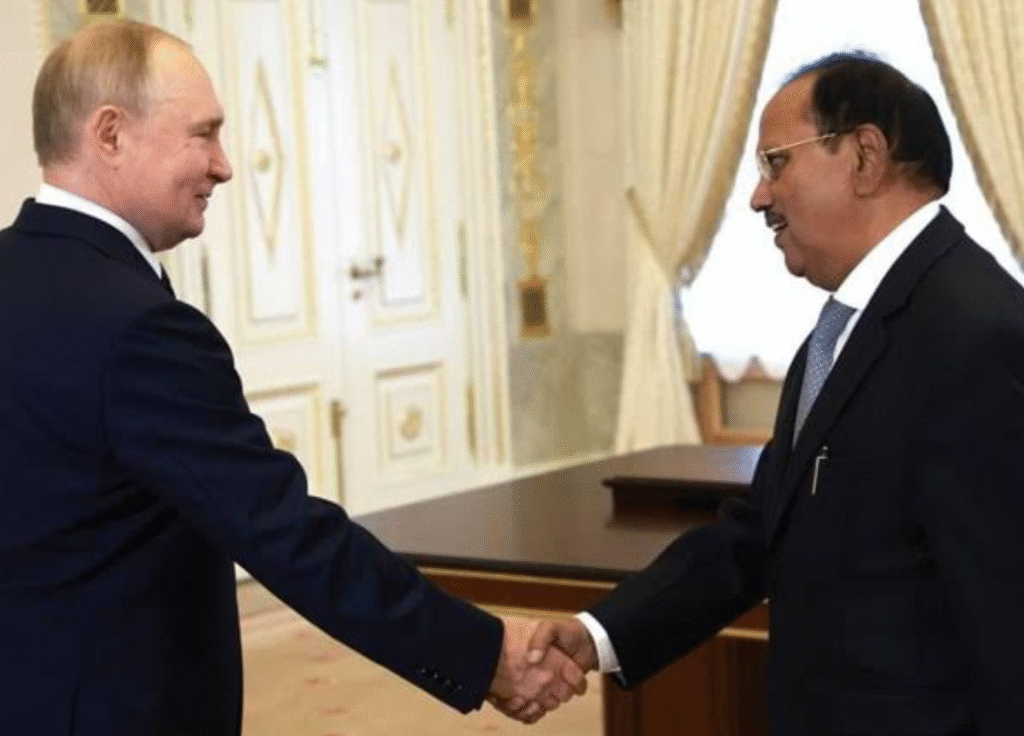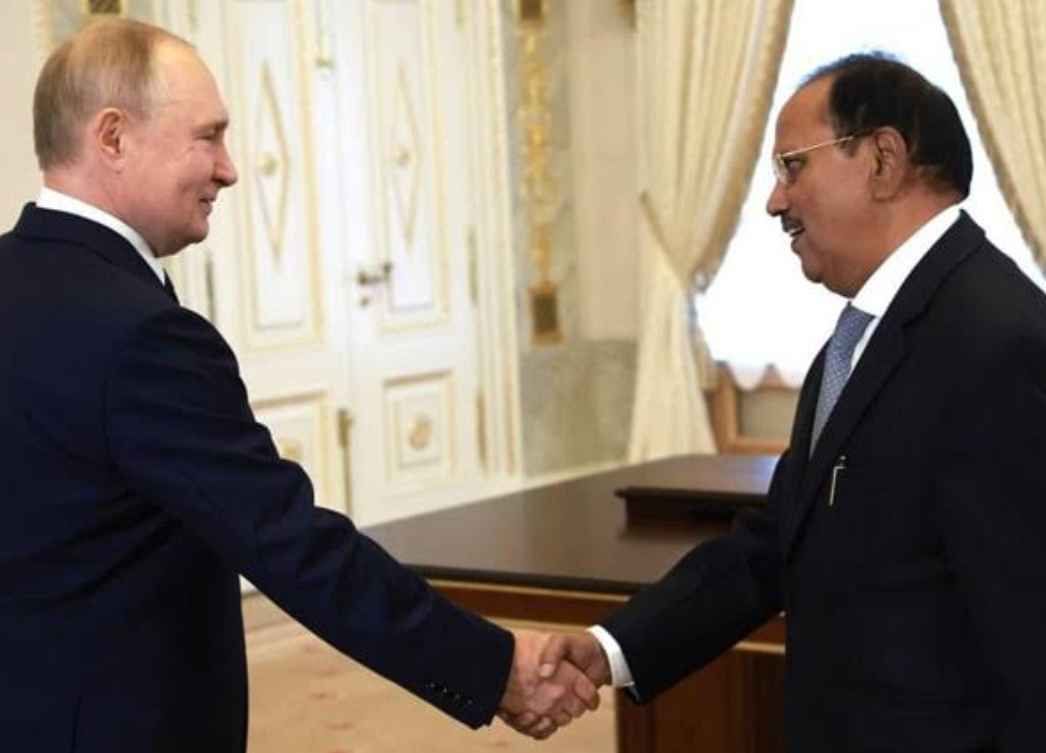National Security Advisor Ajit Doval’s visit to Moscow on August 5, 2025, comes at a critical time as India faces mounting pressure from the United States over its continued oil trade with Russia. The visit aims to bolster defense and energy cooperation with Moscow, reaffirm India’s strategic autonomy, and address regional security concerns. This blog explores the objectives, geopolitical implications, and the broader context of Doval’s trip amid growing global tensions.
Indian NSA Ajit Doval Visits Moscow Amid Rising U.S. Pressure Over Russian Oil Imports
National Security Advisor (NSA) Ajit Doval’s visit to Moscow on August 5, 2025, marks a critical juncture in India’s foreign policy, as New Delhi navigates complex diplomatic terrain between Russia and the United States. At a time when geopolitical tensions are mounting due to the prolonged Russia-Ukraine conflict and escalating U.S. tariff threats, Doval’s trip is being viewed as a clear signal of India’s resolve to pursue strategic autonomy and national interest.
Strengthening India-Russia Strategic Partnership
Ajit Doval’s Moscow trip is primarily will be focused on deepening India-Russia cooperation in defense and energy. However, recent friction with the U.S. over India’s continued oil imports from Russia has given the visit broader diplomatic significance. U.S. President Donald Trump has recently threatened steep tariffs on India, criticizing its ongoing energy trade with Moscow. India, however, has defended its actions, citing consumer welfare and the need to secure affordable fuel supplies for its large domestic market.
This visit of Ajit Doval builds upon a series of high-level diplomatic engagements. Prime Minister Narendra Modi’s visits to Russia in July 2024 and Ukraine in August 2024 were focused on dialogue and diplomacy in the context of the Russia-Ukraine war. Doval’s visit is part of a broader diplomatic calendar that includes an expected visit by External Affairs Minister S. Jaishankar to Russia later in August and an India-Russia summit planned for later this year.
Defense: Fast-Tracking S-400 Deliveries and More
One of the key agenda items for Ajit Doval in Moscow is the acceleration of deliveries of the S-400 air defense systems. These systems, referred to in India as the “Sudarshan Chakra”, form a vital part of India’s defense infrastructure. India is also exploring the possibility of procuring additional S-400 units to further strengthen its air defense capabilities.
India’s recent military exercise, Operation Sindoor, showcased the operational strength of Russian-origin defense equipment such as the BrahMos missile and the S-400. This underscores the value of Indo-Russian defense ties, particularly at a time when India is seeking to modernize its armed forces while ensuring strategic preparedness.
Expanding Energy Cooperation
Energy is another major pillar of Ajit Doval’s visit. India continues to be a significant buyer of discounted Russian crude oil, a policy that has helped stabilize domestic fuel prices amid global market disruptions caused by Western sanctions on Russia.
Discussions in Moscow are expected to focus on long-term energy cooperation, including India’s potential involvement in resource-rich Arctic projects and broader collaboration in high-tech energy sectors. A senior Indian official emphasized that India’s priority is affordability and stability, choosing Russian oil when it is the most cost-effective option available in the international market.
Counterterrorism and Regional Security
Ajit Doval, known for his expertise in intelligence and strategic affairs, is also expected to hold discussions with Russian Security Council Secretary Sergei Shoigu on counterterrorism and regional security cooperation. Both India and Russia have historically worked closely on combating terrorism, particularly in regions such as Central Asia.
Given the intelligence backgrounds of both Ajit Doval and Russian President Vladimir Putin, intelligence-sharing and joint threat assessments may feature in the closed-door meetings. These talks are likely to explore avenues for enhanced coordination on transnational threats, including terrorism financing and extremist networks.

Balancing Geopolitical Pressures
Ajit Doval’s Moscow visit sends a strong diplomatic message to Washington: India remains committed to its “special and privileged strategic partnership” with Russia, despite growing Western pressure. Indian officials have repeatedly stated that the oil trade with Russia is transparent and was, in fact, supported by the U.S. during the early stages of the Ukraine crisis.
This visit reflects India’s broader foreign policy doctrine of maintaining strategic autonomy. As a key player in a multipolar world, India continues to balance ties with the West through partnerships like the Quad (involving the U.S., Japan, and Australia) while sustaining deep-rooted historical ties with Russia.
Possibility of Peace Mediation
Although peace negotiations are not officially on the agenda, Doval’s trip comes in the wake of growing speculation about India’s potential role in facilitating dialogue between Russia and Ukraine. Prime Minister Modi’s meetings with both President Putin and Ukrainian President Volodymyr Zelenskyy in 2024 have positioned India as a possible neutral mediator in the ongoing conflict.
Sources suggest that Doval may carry private messages from Modi to Russian leaders, aiming to build on the diplomatic momentum generated in earlier bilateral meetings.
Rising Tensions with the United States
The visit is taking place in a climate of rising tensions between New Delhi and Washington. Trump’s recent tariff threats have been met with firm responses from India, which has emphasized its right to pursue independent energy and trade policies.
In July 2024, Doval held talks with U.S. NSA Jake Sullivan to address Washington’s concerns over India’s close ties with Moscow. While both nations pledged to maintain strong bilateral ties, U.S. officials like Ambassador Eric Garcetti and Jake Sullivan have expressed unease over India’s strategic decisions regarding Russia.
India has pushed back against this criticism by highlighting the economic rationale behind its Russian oil purchases and reasserting its right to an autonomous foreign policy, grounded in national interest.
Foreign Policy Implications
Ajit Doval’s Moscow visit is emblematic of India’s sophisticated diplomatic balancing act. It demonstrates that New Delhi is capable of pursuing close ties with both the West and Russia without compromising its core strategic interests.
This nuanced approach is winning India recognition on the global stage. Former UN Security Council President Kishore Mahbubani recently lauded India’s ability to maintain warm relations with both Moscow and Kyiv, underscoring New Delhi’s rising geopolitical influence.
On social media platform X, reactions have been mixed. Some users have praised India’s firm stance against Western pressure and applauded its strategic deepening of ties with Russia. Others have speculated about covert intelligence operations, including unverified claims of high-grade explosives shipments to Russia—though such claims remain unsubstantiated and appear to be part of speculative narratives.
Conclusion
Ajit Doval’s visit to Moscow is more than just another high-level diplomatic trip—it is a statement of India’s strategic independence. As the global order continues to evolve, India’s ability to manage relationships across geopolitical divides will be critical to securing its interests, promoting regional stability, and shaping the international balance of power in the years to come.

